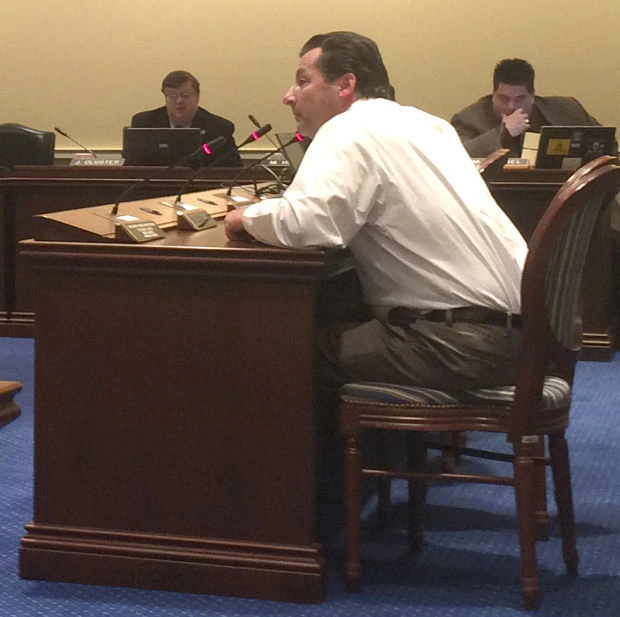Article for The Capital

By Alex Jackson, Staff, Capital Gazette Tony Solesky testifies before the House Judiciary Committee on Thursday during a hearing on two bills that would reverse a 2012 Maryland Court of Appeals ruling that labeled pit bulls “inherently dangerous.” That ruling stemmed from a pit ball attack in Towson in 2007 on Tony’s son Dominic, then 10. Tony Solesky testified against a bill proposed by Del. Luiz Simmons and state Sen. Brian Frosh, both D-Montgomery, that would reverse the court ruling.
State lawmakers are considering reversing a 2012 Maryland Court of Appeals ruling that labeled pit bulls “inherently dangerous” and made dog owners and landlords “strictly liable” for any attacks by them.
There are signs the ruling – and the subsequent failure of the General Assembly to reverse it by altering state laws on liability for dog bites – have made it harder for animal rescue organizations to find homes for pit bulls.
Ali Newman of the Anne Arundel County Society for the Prevention of Cruelty to Animals said pit bulls are the most common breed, and that since the 2012 ruling there has been a slight increase in their numbers at the organization’s shelter.
“We have so many pits here and there are obviously good and bad dogs, just like any breed. But for the most part, they’re very lovable dogs,” Newman said. “What the law says – it just seems that should be the same for every dog and not just one breed.”
Del. Luiz Simmons and state Sen. Brian Frosh, both D-Montgomery, have proposed legislation that would scrap the legal distinction the court created between pit bulls and other dogs.
Under their bills, in dog-bite cases involving all breeds there would be a “rebuttable presumption” that a dog owner knew or should have known that the dog was dangerous. The owner can then offer testimony or other evidence to show there were reasons to think the dog was not dangerous.
The legislation also requires that the decision on whether or not the presumption has been rebutted be made by a jury, denying judges the ability to make a summary judgment.
In previous years, Frosh and Simmons have made separate, unsuccessful efforts to reverse the Court of Appeals ruling.
Last year, a compromise measure similar to the new legislation was approved by a House-Senate conference committee late in the session and subsequently passed in the Senate. But the bill never made it through the House.
Frosh said Thursday that he thinks the bill will pass in this session.
Simmons isn’t as optimistic. At a hearing on Thursday, he asked the House Judiciary Committee to reject any amendments, several times saying he was worried the bill would be undermined by changes.
The 2012 Maryland Court of Appeals ruling in
Tracey v. Solesky
held that pit bulls – not other types of dogs – are “inherently dangerous,” and made the dogs’ owners and their landlords “strictly liable” for any attacks, a tough standard that does not apply for other breeds.
In a special session that year, the Senate passed a bill instituting “strict liability” for owners of dogs of all breeds, but reduced liability for landlords.
The House of Delegates modified the bill so the standard would apply only to dogs running at large. The difference was too much to overcome, and the revised bill failed to pass in both chambers.
Last year, after the House and Senate again approved separate bills, the conference committee drew up a compromise bill under which all dog owners would be held strictly liable if their pets bit a child younger than 13 years old.
The bill again failed to clear both chambers.
This year another bill on the subject has been submitted by Del. Michael Smigiel, R-Caroline. It would keep strict liability only if the dog was running at large.
Smigiel asked the committee to pass his legislation as well as that of Simmons, because the death of last year’s “compromise” bill showed that the effort by Simmons and Frosh might fail.
Like this project
Posted Jan 17, 2024
An article of mine as a reporter for The Capital
Likes
0
Views
1
Tags



